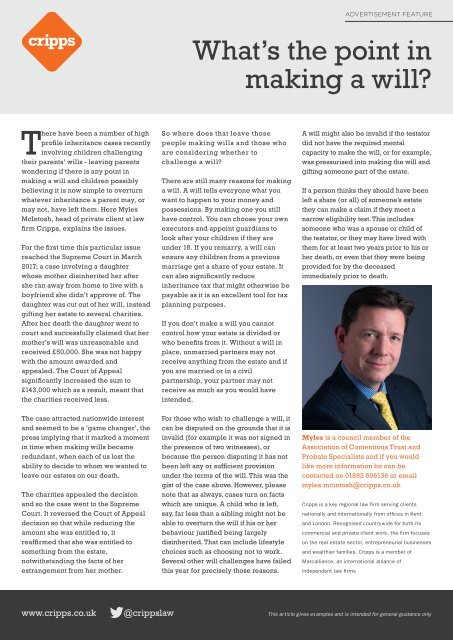Wealden Times | WT183 | May 2017 | Restoration & New Build supplement inside
Wealden Times - The lifestyle magazine for the Weald
Wealden Times - The lifestyle magazine for the Weald
You also want an ePaper? Increase the reach of your titles
YUMPU automatically turns print PDFs into web optimized ePapers that Google loves.
ADVERTISEMENT FEATURE<br />
What’s the point in<br />
making a will?<br />
There have been a number of high<br />
profile inheritance cases recently<br />
involving children challenging<br />
their parents’ wills - leaving parents<br />
wondering if there is any point in<br />
making a will and children possibly<br />
believing it is now simple to overturn<br />
whatever inheritance a parent may, or<br />
may not, have left them. Here Myles<br />
McIntosh, head of private client at law<br />
firm Cripps, explains the issues.<br />
For the first time this particular issue<br />
reached the Supreme Court in March<br />
<strong>2017</strong>; a case involving a daughter<br />
whose mother disinherited her after<br />
she ran away from home to live with a<br />
boyfriend she didn’t approve of. The<br />
daughter was cut out of her will, instead<br />
gifting her estate to several charities.<br />
After her death the daughter went to<br />
court and successfully claimed that her<br />
mother’s will was unreasonable and<br />
received £50,000. She was not happy<br />
with the amount awarded and<br />
appealed. The Court of Appeal<br />
significantly increased the sum to<br />
£143,000 which as a result, meant that<br />
the charities received less.<br />
The case attracted nationwide interest<br />
and seemed to be a ‘game changer’, the<br />
press implying that it marked a moment<br />
in time when making wills became<br />
redundant, when each of us lost the<br />
ability to decide to whom we wanted to<br />
leave our estates on our death.<br />
The charities appealed the decision<br />
and so the case went to the Supreme<br />
Court. It reversed the Court of Appeal<br />
decision so that while reducing the<br />
amount she was entitled to, it<br />
reaffirmed that she was entitled to<br />
something from the estate,<br />
notwithstanding the facts of her<br />
estrangement from her mother.<br />
So where does that leave those<br />
people making wills and those who<br />
are considering whether to<br />
challenge a will?<br />
There are still many reasons for making<br />
a will. A will tells everyone what you<br />
want to happen to your money and<br />
possessions. By making one you still<br />
have control. You can choose your own<br />
executors and appoint guardians to<br />
look after your children if they are<br />
under 18. If you remarry, a will can<br />
ensure any children from a previous<br />
marriage get a share of your estate. It<br />
can also significantly reduce<br />
inheritance tax that might otherwise be<br />
payable as it is an excellent tool for tax<br />
planning purposes.<br />
If you don’t make a will you cannot<br />
control how your estate is divided or<br />
who benefits from it. Without a will in<br />
place, unmarried partners may not<br />
receive anything from the estate and if<br />
you are married or in a civil<br />
partnership, your partner may not<br />
receive as much as you would have<br />
intended.<br />
For those who wish to challenge a will, it<br />
can be disputed on the grounds that it is<br />
invalid (for example it was not signed in<br />
the presence of two witnesses), or<br />
because the person disputing it has not<br />
been left any or sufficient provision<br />
under the terms of the will. This was the<br />
gist of the case above. However, please<br />
note that as always, cases turn on facts<br />
which are unique. A child who is left,<br />
say, far less than a sibling might not be<br />
able to overturn the will if his or her<br />
behaviour justified being largely<br />
disinherited. That can include lifestyle<br />
choices such as choosing not to work.<br />
Several other will challenges have failed<br />
this year for precisely those reasons.<br />
A will might also be invalid if the testator<br />
did not have the required mental<br />
capacity to make the will, or for example,<br />
was pressurised into making the will and<br />
gifting someone part of the estate.<br />
If a person thinks they should have been<br />
left a share (or all) of someone’s estate<br />
they can make a claim if they meet a<br />
narrow eligibility test. This includes<br />
someone who was a spouse or child of<br />
the testator, or they may have lived with<br />
them for at least two years prior to his or<br />
her death, or even that they were being<br />
provided for by the deceased<br />
immediately prior to death.<br />
Myles is a council member of the<br />
Association of Contentious Trust and<br />
Probate Specialists and if you would<br />
like more information he can be<br />
contacted on 01892 506136 or email<br />
myles.mcintosh@cripps.co.uk<br />
Cripps is a key regional law firm serving clients<br />
nationally and internationally from offices in Kent<br />
and London. Recognised countrywide for both its<br />
commercial and private client work, the firm focuses<br />
on the real estate sector, entrepreneurial businesses<br />
and wealthier families. Cripps is a member of<br />
Marcalliance, an international alliance of<br />
independent law firms<br />
www.cripps.co.uk @crippslaw This article gives examples and is intended for general guidance only


















